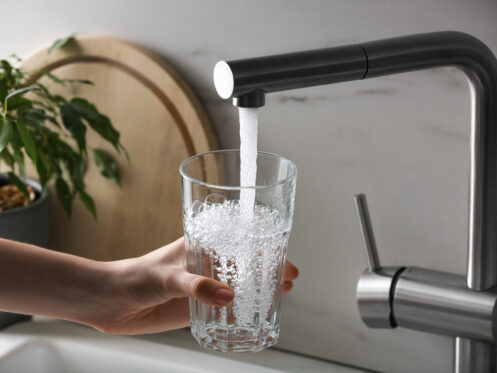If your skin feels tight after a shower or your dishes keep coming out with a cloudy film, minerals in your water might be to blame. Hard water often flies under the radar, but it quietly wears down your plumbing, appliances, and comfort until it becomes impossible to ignore. At Pipe Works Services, in Chatham, NJ, we hear from homeowners who’ve lived with hard water for years without realizing how much damage it caused behind the scenes.
How Hard Water Sneaks Into Your Plumbing
Your pipes aren’t always the problem. If your system’s straining, look at the water. Hard water pulls in calcium and magnesium as it flows through rock-heavy soil. This is more common than most people think, especially in homes with older plumbing or untreated wells. What makes it tricky is that these minerals stay invisible until they leave behind residue. You might first notice hard water as a chalky ring in your tub or a stiff feeling in your laundry.
Beneath the surface, those minerals are building up in your plumbing. Over time, they stick to the inside of pipes, form layers in your water heater, and coat the internal parts of your fixtures. It all adds up to more wear, more maintenance, and eventually, shorter lifespans for appliances you rely on every day.
What It Does to Your Skin, Hair, and Laundry
If your shower leaves you feeling dry and itchy even after a full rinse, you’re not imagining it. The minerals in hard water make it difficult for soap to lather and rinse clean. That can leave a thin film on your skin and hair, almost like residue that won’t quite wash off. Your scalp may feel tight. Your hair may lose volume or get greasy faster than usual.
Over time, you might even notice more breakouts or irritation, especially if you have sensitive skin. The same thing happens in your laundry. Hard water traps detergent in your clothes. Instead of rinsing clean, it clings to the fabric, leaving your laundry stiff, dull, and musty. So you add more soap, thinking it will help, but it just aggravates the problem, creating a cycle where you’re using more products and getting fewer results.
Mineral Buildup in Your Appliances
If you’ve ever pulled out your coffee maker and seen white flakes at the bottom of the tank, you’ve met the mineral buildup caused by hard water. It doesn’t stop with small appliances, either. Your dishwasher, washing machine, water heater, and even refrigerator can develop scale if your home has hard water. In dishwashers, it can clog spray arms and dull the shine on glassware. In washing machines, it leaves behind grime and makes it harder for clothes to rinse clean.
Inside your water heater, those minerals settle at the bottom of the tank, which makes it harder for the burner or heating element to do its job. That layer of sediment acts like a blanket, forcing the heater to run longer and hotter. That extra strain raises your energy bills and shortens the life of the appliance. If your heater is rumbling or taking longer to recover between uses, scale could be the reason.
How to Tell If You Have Hard Water
One of the easiest ways to spot hard water is to check for spots and streaks on dishes, especially after running the dishwasher. Another sign is soap scum in your shower or film on your faucets. If you have to use vinegar regularly to keep your fixtures looking clean, mineral buildup could be the culprit. You might also notice a crusty white ring around faucet bases or showerheads. That’s a sign that minerals are drying and hardening on the surface, and they’re likely inside the plumbing, too.
Water pressure changes can also hint at a buildup in your pipes. If pressure drops in one area but not others, it could be due to mineral clogging rather than a leak. Water tests from a hardware store or plumber can confirm the hardness level, but many of the early clues show up in your day-to-day routines. If you’ve started to notice buildup more often or found yourself cleaning fixtures more frequently, it may be time to look deeper.
Why Hard Water Damages Pipes Over Time
While the impact on appliances and skin might feel immediate, the damage to your pipes builds slowly. Hard water causes scale to form along the interior walls of your plumbing. As that scale thickens, it narrows the passage for water to flow through. That can create pressure imbalances, restrict hot water delivery, and even lead to full blockages in older galvanized pipes. The problem worsens in hot water lines because heat accelerates mineral crystallization.
So your hot side tends to clog faster than the cold. Scale also affects water-using valves, like those in washing machines and dishwashers, causing them to stick or break down. In severe cases, buildup can cause pipes to corrode faster or increase the chance of pinhole leaks. If your plumbing seems like it’s aging faster than expected, hard water could be doing more behind the scenes than you realize.
Why Water Heater Problems Are Often Linked to Hard Water
If your hot water keeps cutting out or your tank sounds like it’s filled with rocks, that’s not wear and tear—it’s hard water stacking up inside. Every time your heater kicks on, those minerals cook into a crust that chokes performance and kills efficiency. Over weeks and months, that layer thickens until the heater struggles to keep up. You end up waiting longer for hot water and paying more to heat it.
In electric models, scale can cover the lower element completely, trapping heat and forcing the thermostat to work overtime. In gas models, sediment sits right on top of the flame plate, acting like a shield. The burner fires longer, the tank overheats, and the efficiency tanks. If you’ve started to hear rumbling, popping, or knocking sounds during heat cycles, it’s likely the water is bubbling through a layer of trapped sediment.
That extra strain shortens the tank’s lifespan and increases the risk of a leak or complete failure down the line. Routine flushing can help, but if your water is mineral-heavy, those problems return fast. This is one of the first places hard water shows its effects, and often one of the most expensive if left unchecked.
Does a Water Softener Really Make a Difference?
A water softener strips out the heavy minerals, like calcium and magnesium, before they ever touch your pipes. It uses ion exchange, trading those hard minerals for sodium or potassium so they don’t clog or coat anything. What you get is water that actually feels clean. Your skin’s smoother, your hair rinses better, and your dishes stop coming out filmy. Give it a few days, and you’ll feel the difference every time you turn on the tap.
Over time, a softener also protects your plumbing and appliances by preventing new scale from forming. It won’t remove the buildup that’s already there, but it will stop things from getting worse. That can mean fewer service calls, less money spent on repairs, and a longer lifespan for your water heater, dishwasher, and washing machine. For many homes with moderate to high mineral levels, the savings add up quickly.
Schedule a Hard Water Service Visit
Hard water might not seem urgent until it starts affecting your budget and your comfort at the same time. Whether you need help with testing, water treatment options, or improving your home’s overall plumbing performance, Pipe Works Services is here to help you sort it out. Schedule a visit with Pipe Works Services to get started on a plumbing solution that fits your home.





